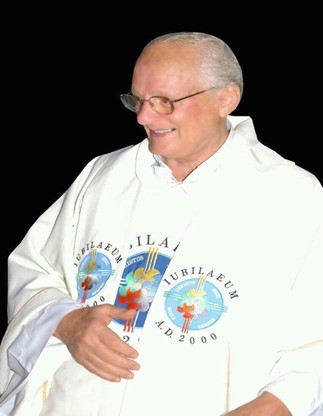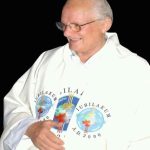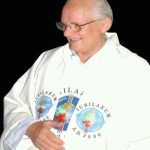Political instability
In 1971, General Idi Amin Dada overthrew the government of President Dr Apollo Milton Obote I. Political unrest gripped much of the Acholi sub-region when many of her sons, including those in the military and civil service, were targeted and killed overnight. As this political onslaught intensified, children who were left fatherless became homeless and began to drop out of school; others became orphaned and destitute.
Using financial contributions from Italian friends, Father John Scalabrini set up a fund to provide school fees for many of these children. It was also at this point that he developed the idea of establishing Bishop Angelo Negri Primary and Nursery school in 1972, the first private primary school in the region. He paid for the education of many children here and supported the operations of the school. Until the late 80s, Negri led the way for quality education in the entire northern region.
Father John Scalabrini recalls that rumours soon went around that he was involved in subversive activities because he was helping the children of perceived enemies of the regime. “The school’s mantra to ‘train future leaders’ greatly worried Idi Amin at the time, so he sent Ali Fadhul, one of his officers, to see what kind of leaders were being groomed here. Fadhul was surprised to find little children taking normal classes,” he narrated.
“At the end of his fact-finding mission, Fadhul even promised to bring his own children to Negri, but some people went and told Amin that we were training guerrillas to overthrow his government.”
Father John Scalabrini was arrested on more than two occasions and on both occasions was released by Amin’s soldiers without any charge. But the release often followed intensified intervention of the Italian government, which always insisted that the Amin government provide proof or evidence against the priest. Then, in 1975, Father John Scalabrini was asked to take a group of Ugandan Catholics on a pilgrimage to Italy when he heard the news of his deportation from Uganda. It was August 1975.
He was among 16 Verona missionaries allegedly accused of “spying and being agents of foreign governments”. It was a big blow for the man to whom Uganda had become home. “No clear reasons were given for our deportation. I became very depressed and unhappy,” he says. Several attempts were made by Bishop Cyprian Kihangire, the Ordinary of Gulu Diocese then, to negotiate the return of his Vicar General and other Comboni Missionaries.
“The coup against Obote(in July 1985) originated from Gulu, the home area of the two Okellos, Tito Okello-Lutwa and Bazilio Olara Okello. More precisely, it was organised and blessed by Fr. John Scalabrini, an Italian priest who commanded a lot of respect among the Acholi population.”- Uganda’s Revolution 1979-1986 How I Saw It(Pecos Kutesa).
37 years ago during the signing of the Pece Peace Accord between the National Resistance Army(NRA) and the Uganda People’s Democratic Army(UPDA) on Friday, June 3, (Uganda Martyrs Day), Fr. John Scalabrini who was Vicar General of the Gulu diocese, the Bishop of the diocese, Rt. Rev. Dr. Cipriano Kihangire, among other religious leaders, was present to witness the occasion. President Yoweri Museveni and Commander-in-Chief of the NRA signed on behalf of NRM government, while Lt. Col. John Angelo Okello Keno signed on behalf of the UPDM. [Watch the video on YouTube shared by Bart Kakooza for details]
Months later, Fr. Scalabrini was deported from Uganda. Earlier in 1975, he was among the Comboni Missionaries expelled from Uganda by the government of Gen. Idi Amin Dada.
Emilly C. Maractho(PhD), an academic in an article published in the Daily Monitor newspaper, wrote, ” Most people know him as the late Fr. John Scalabrini, an Italian priest with a passion for a mission, the size of which we cannot imagine.”
More about Fr. John Scalabrini, aka Padre Giovanni Scalabrini, published here in the life history: Celebrating a Life dedicated to Serving God and Saving Humanity(1934-2016).

Gulu Archdiocese Cathedral, where Father John Scalabrini worked for many years.
All were in vain. The Bishop’s attempts to talk to President Amin were all frustrated. He was even threatened with arrest. When Amin’s government fell later in 1979, arrangements were made for Father John Scalabrini to come back to Uganda.
Return to Uganda
Bishop Cyprian Kihangire worked tirelessly and pressured the incoming Obote II Government to return Father John Scalabrini and other deported priests to Uganda. “I was in Italy when Hon Andrew Benedicto Adimola, the new Minister of Reconstruction and Rehabilitation, called me. I had been accepted to return and continue my work in Uganda. I returned on Christmas Day 1979. I always remained positive and carried on with my spiritual duties, but I also remained keen on economic development. In the face of economic hardship and food shortage following the war that removed Amin from power, I initiated the growth of Sunflower.
“It all started small. One day, I went to visit a family at the Italian embassy in Kampala who were returning home at the end of their stay in Uganda. They offered me their parrot and half a bag of sunflower seeds to feed it. On returning to Gulu, I sprinkled some of the seeds on the ground. They sprouted after three months. I was surprised. I tried to squeeze some oil out of the seeds, but very little came out. This was the start to a rich harvest for the future.”
“I collected 9 million Italian Lira (about sh 15m) on my next visit to Italy, bought seven tonnes of sunflower seeds, and produced some small sachets of oil. We also developed sunflower growing manuals for farmers. I returned to Italy and bought a sunflower oil extraction machine. It was installed in Gulu. The people of Acholi are very resourceful, truthful, and obedient people I have ever met, that is why I loved being here and initiated projects here, I became one of them, Acholi became home for me.”
By the mid-1980s, Father John Scalabrini’s sunflower project was producing over 3,000 20-litre Jerrycans of cooking oil and supplying seeds and other sunflower products to Masindi, Hoima, and other areas. Sunflower growing blossomed in the Acholi sub-region and spread to other parts of the country. “The war that brought in the new government in 1986 and the 20 years with the Lord’s Resistance Army (LRA) destroyed all the good things that we had done in Acholi and the greater northern Diocese of Gulu,” he said. “This was the beginning of very tough times for this region.”
Deported for the second time
“Again, many children were left fatherless and without families. Others were left to me by their parents under my direct care to look after them as they fled the country. They were all my children, and I could not turn my back on them. Some of these children were targeted by the government because their fathers were big people in the previous government, and because of this, I became an enemy of the government. They accused me of supporting rebels. I was at Entebbe International Airport awaiting a flight to Mombasa when soldiers arrested me. They led me to Entebbe Police station, without any explanation,” he recounts. After one night in Entebbe, I was transferred to the Central Police Station (CPS) in Kampala and detained on trumped-up charges of allegedly supporting rebels. I told my captors that all the children in my care are my children, and others are former students who still require support from me. They were known to me. They respected me. But I had nothing to do with rebel activities.”
Father John Scalabrini spent two weeks in detention at CPS, and then three weeks under house arrest in Bugolobi. President Yoweri Museveni ordered his deportation back to Italy in 1989. But this infuriated the Italian government, which threatened to cut aid to Uganda and recall its Embassy. After numerous discussions between the governments of Italy and Uganda, Father John Scalabrini was allowed to return to Uganda at the end of 1989. However, on getting to Entebbe, the Ugandan government told him that he had been allowed to return to Uganda under one condition: “I was not to set foot in Gulu and the wider Acholi sub-region.”
This post was created with our nice and easy submission form. Create your post!





